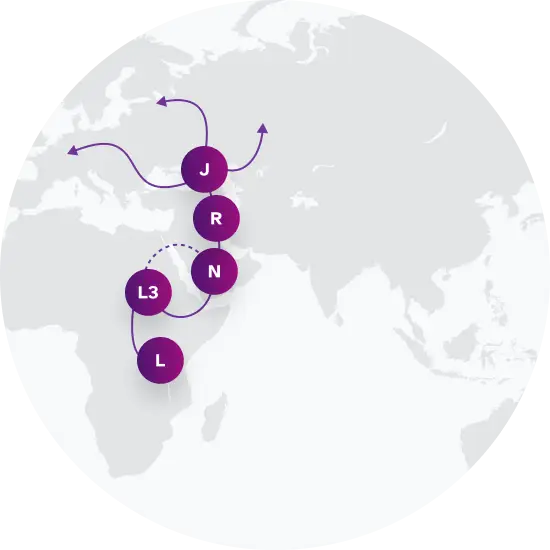Haplogroup J2a1
What is Maternal Haplogroup J2a1?
Haplogroup J2a1 is a genealogical group of lineages defined by unique genetic markers present in your mitochondrial DNA, which is transmitted from your mother. Your maternal haplogroup paints a picture of your ancient origins and the migrations of your ancestors. Although your maternal haplogroup reflects just one of your many ancestral lineages, it carries information about that lineage over tens of thousands of years.
Haplogroup J2a1 is descended from haplogroup J. Among 23andMe research participants, haplogroup J2a1 is commonly found among populations in the United Kingdom, Italy and Ireland.
It's important to note that your haplogroup doesn't define your current ethnic identity; rather, it provides an insight into your deep ancestry on the maternal side.
 Maternal Haplogroup Origins J
Maternal Haplogroup Origins JTop Surnames with Haplogroup J2a1
For surnames with sufficient representation in the data, these percentages represent the frequency with which each surname is found in individuals exhibiting this genetic marker.
Haplogroup J2a1 is linked to Angles, Saxons, and Jutes
Today, J2a can be found among about 4% of people living in Denmark and northern Germany. It is also found in England and parts of Scotland, where the haplogroup is thought to have entered with Jute and Saxon invaders during the 5th and 6th centuries AD. In fact, scientists have recently been able to extract DNA from Anglo-Saxon skeletons buried in English cemeteries from the 5th to 7th centuries AD. Analyses of those samples indicate that haplogroup J was at least as common in medieval English populations as it is today. But like the Anglo-Saxons themselves the J2a haplogroup never reached more remote parts of Britain such as highland Scotland and Wales, where Celtic-speaking populations have persisted into modern times.
 Copenhagen, Denmark.
Copenhagen, Denmark.